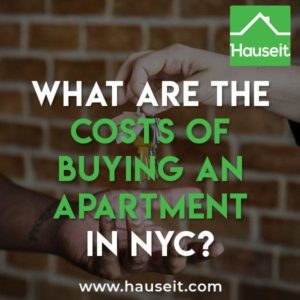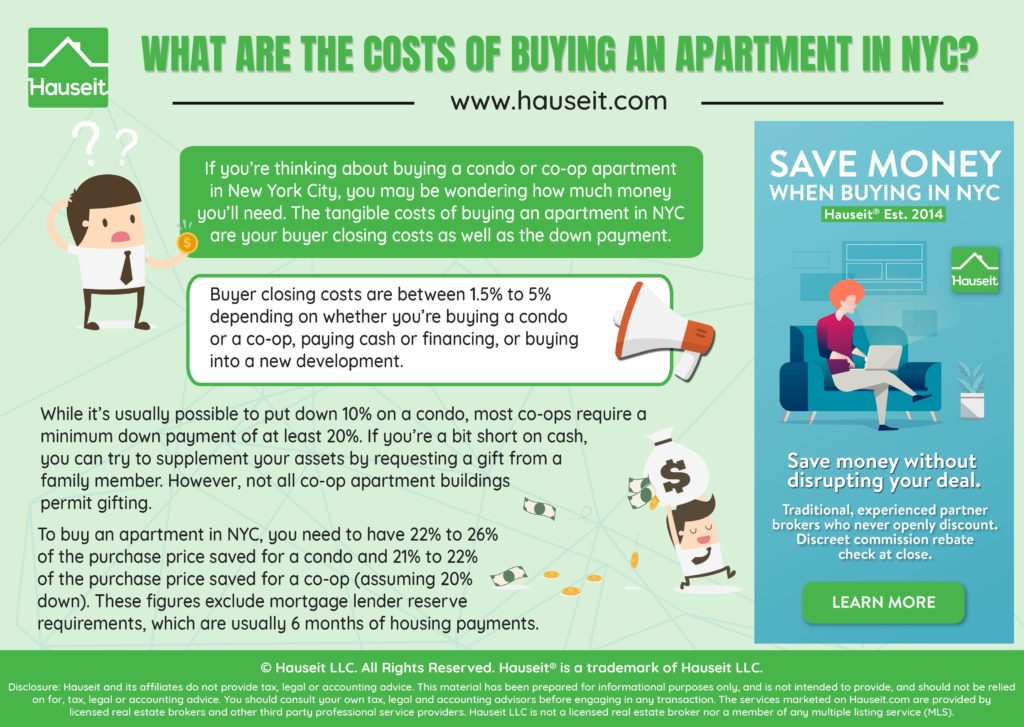What Are the Costs of Buying an Apartment in NYC? If you’re thinking about buying a condo or co-op in NYC, you may be wondering how much money is required to buy an apartment. The tangible costs of buying an apartment in NYC are your buyer closing costs as well as the down payment.
Buyer closing costs are between 1.5% to 5% depending on whether you’re buying a condo or a co-op, paying cash or financing, or buying into a new development.
You can estimate your buyer closing costs using Hauseit’s Buyer Closing Cost Calculator. To calculate how much apartment you can afford, visit Hauseit’s Home Affordability Calculator.
Table of Contents:

The costs of buying an apartment include tangible and intangible expenses. The actual costs of buying an apartment consist of your buyer closing costs as well as your down payment.
The intangible costs of buying an apartment in NYC include the time spent finding the right apartment, the emotional energy you’ll exert after finding an apartment as you navigate towards closing, and the occasional headaches of home ownership.
Fortunately, there are a number of benefits to buying vs. renting in NYC which include the ability to obtain inexpensive leverage by taking out a mortgage.
Here’s an example of how much it costs to buy a $1,000,000 condo apartment in NYC:
Here’s an example of how much it costs to buy a $1,000,000 co-op apartment in NYC:
As the example above illustrates, buyer closing costs are higher for condos compared to co-op apartments in NYC. The difference in closing costs is the tip of the iceberg when comparing condos vs. co-ops in New York City.
Get a 2% Rebate When You Buy
Save thousands on your home purchase with a buyer agent commission rebate from Hauseit
Buyer closing costs in NYC are between 1.5% to 5% of the purchase price.
There is a wide range for potential closing costs in NYC because they depend on a number of factors, including the apartment type (condo vs. co-op), how much you finance, how much your lawyer charges, and whether you’re buying new construction.
Buyer closing costs are higher for condos vs. co-ops if you are financing because of the Mortgage Recording Tax and Title Insurance.
These additional closing costs only apply to real property. Since co-op apartments are not considered to be real property, buyers of co-ops do not have to pay these closing costs.
Save 2% On Your Home Purchase
Save thousands on your home purchase with a buyer agent commission rebate from Hauseit
The most common down payment in NYC is 20% of the purchase price. While it’s certainly possible to finance 90% on an apartment purchase in NYC, most co-ops have financial requirements which require a minimum down payment of at least 20%.
Because most apartments in NYC are co-ops, it’s far more common to see 20% as a down payment amount compared to 10%.
If you’re buying a condo apartment, you can receive a gift from a friend or family member to help you with the down payment.
Not all co-op apartment buildings permit gifting. One easy way to get around this is to receive a gift well in advance of your purchase.
Since most co-op board applications only ask for around 3 months of bank statements, your gift won’t be noticed if you receive it before the beginning of the 3 month period.
Most banks will require you to have at least 6 months of combined monthly mortgage, taxes, and common charges or maintenance payments after you close on your apartment purchase.
If you have other debt such as student loans or a car payment, this 6-month reserve requirement will also include the amount of your other fixed monthly debt.
Unfortunately, most co-op apartments in NYC will require around 2 years of post-closing liquidity in order for you to receive co-op board approval. If you can afford your down payment and closing costs but are short on post-closing liquidity, you can always obtain a gift to help you with your post-closing liquidity.
Please note that not all co-op buildings permit gifting, so it’s something you should have our buyer agent confirm before making an offer.
A Full Service Listing for 1%
Sell your home with a traditional full service listing for just one percent commission.
Once you’ve closed on an apartment in NYC, your primary expenses will be your mortgage payment, monthly maintenance or common charge bill, as well as real estate taxes if you’ve purchased a condo.
Co-ops do not have a separate real estate tax bill, as the monthly maintenance you pay includes the cost of the building’s real estate taxes.
For condos, you have two separate bills: common charges and real estate taxes.
Apartment ownership in NYC comes with other costs from time to time such as special assessments, building fees (such as for making renovations), as well as fines from your condo or co-op board.
Your building may also have to pay legal bills from time to time as the building navigates litigation and considers other matters (for example, selling air rights).
There are also intangible costs associated with owning an apartment in NYC. Living in an apartment building is no different from what you experience in the workplace as individuals battle for relevance and authority.
If you are living in a small building, there’s a greater risk that you’ll have to deal with one or two petty, bad apples on the board (or perhaps the president him or herself) who will try and control everything. Larger buildings are more anonymous, but they still have their downsides.
Disclosure: Commissions are not set by law or any Realtor® association or MLS and are fully negotiable. No representation, guarantee or warranty of any kind is made regarding the completeness or accuracy of information provided. Square footage numbers are only estimates and should be independently verified. No legal, tax, financial or accounting advice provided.






